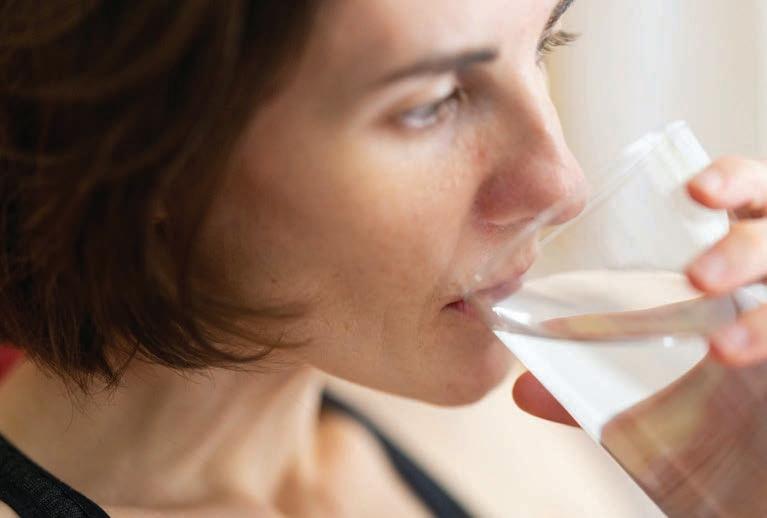
6 minute read
Health & Science
1. Anxiety
Stress and worry aren’t great germ ghters. Just having anxious thoughts can weaken your immune response in as little as 30 minutes. Constant stress takes an even bigger toll and makes it harder to fend o the u, herpes, shingles, and other viruses. Talk to your doctor if you can’t shake your worry or if it gets in the way of normal life.
Advertisement
2. Lack of Sleep
Not getting enough sleep can make you more likely to catch viruses or germs. And you also may take longer to get better. at’s because your body can’t make as many infection- ghting cells and proteins called antibodies that help defend against illness. Your body releases certain proteins that help the immune system, called cytokines, only during sleep.
3. Low Vitamin D
You may know you need it for strong bones and healthy blood cells. But vitamin D also helps boost your immune system. You can get it in eggs, fatty sh, and forti ed foods like milk and cereal. Sunlight is another key source. e lack of it in Ireland makes Irish people particularly prone to a lack of vitamin D. In the summer, just ve-15 minutes of rays on your hands, face, and arms two-three times a week usually is enough. In the winter, you might need a bit more.

4. Certain Medications
ey include drugs to treat allergies, arthritis, lupus, IBS, and organ transplant. Corticosteroids are one example, as are TNF inhibitors for in ammation and chemotherapy for cancer. Talk with your doctor before you adjust any prescription medication.

5. Too Little Fruit ‘n’ Veg
ese foods may help your body make more of the white blood cells you need to ght o infections. Fresh produce and nuts and seeds pack a lot of zinc, beta-carotene, vitamins A, C, and E, and other nutrients you need for a healthy body. Plant-based foods also ll you up with ber, which helps lower your body fat percentage, which can strengthen your immune response.
6. Marijuana
Smoke from cannabis can in ame your lungs. If you use it regularly, you may have the same breathing problems you can get from nicotine cigarettes. at means coughing up coloured mucus called phlegm and a higher chance of lung infections.
7. High-Fat Diet
Oils can hinder germ- ghting white blood cells. And high fat diets over time can upset the balance of bacteria in your gut that can help immune response. Look for low-fat dairy with no added sugar, along with lean protein like seafood, turkey, and chicken, or lean cuts of beef with any visible fat cut o . Also, being obese seems to make you more likely to get the u and other infections, like pneumonia.

1. Using Bottles With BPA
BPA is short for the chemical bisphenol A. It’s used to make lots of products, including water bottles. But research shows BPA can get into your food and drinks. ere’s also concern that too much exposure can lead to birth defects. More research is needed, but experts think the chemical might also play a role in some health conditions. ese include high blood pressure, hormonal imbalance, type 2 diabetes, and cardiovascular disease. Opt for water bottles that say they’re BPA-free or made with glass or stainless steel.

2. Believing e Cold Water Myth
Cold water doesn’t narrow your blood vessels or make food harder to digest. It’s an easy way to cool down and hydrate when you’re hot. If you have a cold, warm water will help thin your mucus, but that’s about it.
Bad habits that suppress your immune system
8. Too Little Time Outdoors
Sunlight may energise special cells in your immune system
Here’s how you’re drinking water wrongly
esh. Fruit and veggies sliced on the same board used to cut raw meat can also lead to foodborne illness. So can items not stored at the right temperature. Be sure to wash or scrub fruits and vegetables under running water.
4. Not Drinking It With Alcohol
Alcoholic drinks are diuretics, which means they trigger your body to make more pee. And peeing a lot can lead to dehydration. To avoid this, match your drinks one for one: that’s one glass of water for every cup of co ee or alcoholic drink.
5. Not Downing A Full Glass With Pills
Don’t just drink enough to get them down your throat. Use vitamins and medication as an opportunity to hydrate. Drinking a full glass of water also helps keep medicine from getting stuck in your esophagus and irritating it. It helps your body better absorb water-soluble vitamins, too.
6. Adding Anything Arti cial
It’s ne once in a while, but doing it every day isn’t recommended. Research suggests arti cial avourings and sweeteners may put you at higher risk for type 2 diabetes and cancer. ey can also make you feel hungry more often. Try to avoid anything with sugar, high fructose corn syrup, aspartame, or sucralose. Use lemon, lime, mint, herbs, or cucumbers instead. But don’t forget to wash them rst.
7. Not Reaching For It When Tired
Feeling fatigued and don’t know why? It could be a sign of dehydration. You don’t have to be sick or exercise hard to get dehydrated. You lose water every day through basic body functions like breathing and pooping.
called T- cells that help ght infection. But being outside brings other bene ts, too. Many plants in the woods make phytoncides and other substances you breathe in that seem to bolster your immune function.
9. Smoking
Nicotine from cigarettes, chewing tobacco, or any other source can weaken your body’s ability to ght germs. Yes, vaping counts, too. And it’s not just the nicotine. Other chemicals in e-liquids seem to suppress your immune response, especially when you inhale them through vaping.
10. Alcohol
Just overdoing it once slows your body’s ability to ght germs for up to 24 hours. Over time, drinking too much blunts your body’s ability repair itself. at may be part of the reason you’re more likely to get illnesses like liver disease, pneumonia, tuberculosis, and certain cancers. If you use alcohol, try to keep it to one drink a day for women and two drinks for men.
11. Grief
ere is some evidence that sorrow, especially if lasts a long time, can depress your body’s immunity. e e ect can linger for 6 months, but may go on longer if your grief is deep or doesn’t ease. Talk to your doctor or a mental health professional if you need help with a loss or traumatic event.
12. Lack Of Exercise
Regular aerobic exercise appears to help your body ght illness caused by viruses and bacteria. at’s in part because it helps blood get around your body more e ciently, which means germ- ghting substances get where they need to go. Scientists continue to study exactly how exercise helps boost your immune system.
13. No Sex
Good news! Weekly intimacy seems to help boost your immune system compared to those who have it less often. Sex raises levels of a germ- ghting substance called Immunoglobulin A, or IgA. But more may not always better. Couples who had sex more than twice a week had lower levels of IgA than those who had no sex at all.







